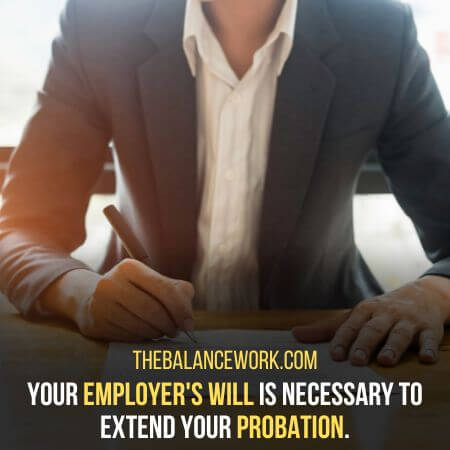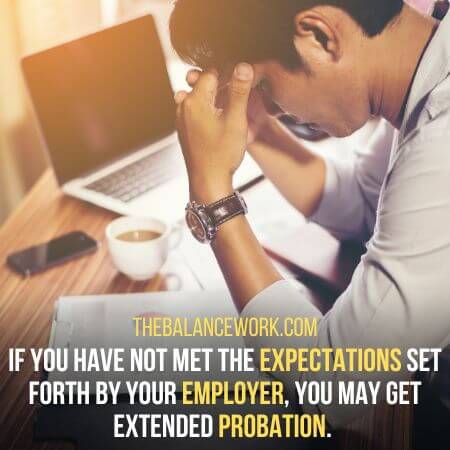Are you thinking of extending probation period at work? If yes, then this post is for you.
Extending a probation means that an employer can continue to test an employee’s job performance for a set period.
This can be beneficial for both the employer and the employee.
Extending Probation Period At Work
There are a few things you should keep in mind when extending probation period at work:
1. Employer May Not Like It:
If you’re on probation at work, your employer may not be too thrilled about the idea.
They may see it as a sign that you’re not meeting their expectations.

They may thus view it as a negative reflection on your job performance.
Your employer’s will is necessary to extend your probation. Otherwise, it will be up to their discretion whether or not to keep you on staff.
Thus, you should tread lightly when approaching this topic with your boss.
2. It May Not Be Up To You:
While you may be the one who wants to extend your probationary period, the decision is up to your employer.
There are company rules in place that dictate employer’s extension of probationary period.
These rules and procedures vary from company to company. It’s essential to be familiar with your company’s policy on the matter.
If your employer’s not on board with the idea, you can do nothing about it.
You’ll have to wait it out until your probationary period is up.
3. It May Be Difficult to Get Off Probation:
Once you’ve been placed on probation, it can be challenging to get off it.
Your employer may use the extension as an opportunity to keep you on probation for an even more period.
If you’re not careful, you will be stuck on probation indefinitely. What’s the result?
It is possible that you could be fired from your job if you don’t meet the expectations.
4. It May Affect Your Job Security:
Extending your probation period at work may affect your job security. If you got the extension, you haven’t met the standards set by your employer yet.
Thus, they may see this as a reason to let you go. If you’re thinking about extending your probation, weigh the pros and cons beforehand.
It should be a decision in your best interest, not your employer’s.
5. It Can Be Uncomfortable:
The extension can make things quite uncomfortable for you at work.
Your colleagues may start to see you as not up to the task, which can lead to tension and conflict.
Additionally, your boss may begin to view you as a liability. It could lead to them micromanaging you or keeping a closer eye on your work.
The bottom line is that an extension can make things quite uncomfortable for all.
6. It Can Affect Your Morale:
Extending your probationary period can also hurt your morale.
If you feel like you’re not meeting the standards set by your employer, it can be tough to stay motivated.

If you’re stuck in a situation where you’re on probation indefinitely, it can be hard to have hope.
The key is to stay positive and keep your head up. Remember that this is a temporary setback and that things will eventually get better.
7. It May Not Be Necessary:
An extended probationary period may not be necessary if you resolve the issues that led to it.
If you can work on the areas that need improvement, they may not feel the need to extend your probation.
Show your employer that you’re capable of meeting their expectations. This is why it’s essential to be proactive.
Take steps to improve your performance if you’re placed on probation.
8. It Can Lead To More Stress:
An extended probationary period can lead to more stress at work and home.
If you’re worrying about meeting the standards set by your employer, it can take a toll on your mental health.
Additionally, if you’re worried about being fired, it can be tough to focus on your work and be productive.
The key is to manage your stress levels. Find healthy coping mechanisms to deal with the added pressure.
9. It May Not Be Fair:
You may feel like extending your probationary period is unfair.
It is specially if you feel like you’re meeting the standards set by your employer.
If this is the case, it’s crucial to have a conversation with your boss and express your concerns.
It’s also important to remember that not all employers are fair.
There’s always the possibility that you could get the extension even if you’re performing well.
10. This Is Just A Setback:
It’s important to remember that an extended probationary period is just a setback.
It’s not the end of the world, and it doesn’t mean that you’re a lousy employee.
If you’re able to stay positive and focus on improving, you’ll get past this hurdle. Keep your head up, and don’t let it get you down.
How to Extend Probationary Period At Work?
If you want to extend your probationary period because you might feel getting fired soon, here are the steps to follow:
1. Talk To Employer:
The first step is to talk to your employer about your situation.
Explain why you feel like you need more time and what you plan on doing to improve your performance.
Start with a positive attitude and be open to their feedback. You can say something like:
“I understand that my performance has been below expectations. Thus, I’m willing to do whatever it takes to improve. I was hoping we could extend my probationary period to have more time to show you what I’m capable of. What do you think?”
2. Get It In Writing:
Make sure that any agreement to extend your probationary period is in writing.
This will protect you in case there are any disputes down the road. Get your employer to sign the agreement and keep a copy for yourself.

It’s also a good idea to have a lawyer look it over to ensure that everything is fair and square.
3. Come Up With A Plan:
After you’ve talked to your employer, it’s time to develop a plan.
This plan should include what you need to work on and how you’re going to improve your performance.
Be specific and make sure that your goals are realistic. Additionally, make sure to get your boss’s input on your plan so they can help you stay on track.
With the program, you can show your employer that you’re serious about improving.
4. Set A Timeline:
Once you’ve come up with a plan, it’s essential to set a timeline.
This will ensure that you and your employer know how long the extension will be. It’s also necessary to make sure that the timeline is realistic.
If you’re not sure how long it will take to improve your performance, talk to your boss and get their input.
5 Follow Through With Your Plan:
Once you’ve come up with a plan, it’s essential to follow through with it.
This means taking the steps necessary to improve your performance. If you say you’re working on being more punctual, make sure you do it.
If you say you’re going to improve your communication skills, make sure you do.
It’s also essential to keep your boss updated on your progress.
Let them know what’s working and what’s not. This way, they can offer guidance and help you stay on track.
6. If Your Employer Extends Your Probation:
If your employer decides to extend your probationary period, staying positive is essential.
Remember that this is a setback and that you can still prove yourself by putting in the work.
Talk to your boss and make sure you understand why they made this decision.
Then, use it as motivation to improve your performance. With hard work and dedication, you’ll eventually get past this issue.
When Is Extending Probation Period At Work Suitable?
There are a few circumstances in which it may be appropriate to extend probationary:
1. Poor Performance Review:
If your boss is unhappy with your performance during your probation, they may decide to extend it.
This gives you more time to work on the areas that need improvement.
Prove to them that you’re capable of meeting their expectations. Start by setting some goals and then work hard to achieve them.
2. If You Have Not Met The Expectations:
If you have not met the expectations of your employer, you may get extended probation.
Now you have more time to complete their expectation.

Make sure you understand what they expect of you and then take steps to meet those expectations.
3. If There Are Issues Unresolved:
Unresolved issues from your probationary period, can get an extension in probation.
When granted the extension, it is time to start working on these issues.
Make sure you understand the problems and then take steps to resolve them.
Be sure to take advantage of the opportunity to prove yourself and turn things around at work.
4. Change In Role:
If there’s been a change in your role or responsibilities, it is suitable to extend your probation.
This gives you time to adjust to the new position and make sure you’re meeting their expectations.
If you’re unsure about what’s expected of you, ask for clarification. Make sure you understand the new role before taking on any responsibilities.
5. You Can’t Settle In:
If you’re a new hire, your employer may decide to extend your probationary period.
This gives you time to settle into the new position and make sure you understand the company.
If you haven’t still learned and understood the company, start asking questions.
The more you know about the company, the easier it will be to meet their expectations.
6. Poor Performance:
If your performance has been poor, your employer extends your probationary period.
Poor performance is usually due to a lack of understanding or not meeting the expectations.
As a new employee, you should be vigilant in meeting the expectations set forth by your employer.
If you’re unsure about what’s expected of you, ask for clarification.
7. Attendance Issues:
If you’ve had attendance issues, getting an extension in probation is usual.
Attendance is an essential part of the job. If you’re not meeting the expectations, your employer may extend your probation.
Make sure you understand the attendance policy. Take steps to improve your attendance.
8. Short Term Illness:
If you’ve been on short-term illness, it is courteous to extend probation. You may have been away from work for a while.
Your employer wants to make sure you can still meet their expectations.
Make sure you understand the expectations before returning to work.
9. If You’re Not A Good Fit:
If you’re not a good fit for the position, you might get probation extended.
This gives you more time to see if the place is right for you.

If you’re not sure if the position is correct for you, ask for guidance from your boss. They can help you decide whether or not to stay in the role.
10. You’re Not Ready Yet:
If you’re not ready for the position, extending probation is necessary.
You have to prove to your employer that you’re capable of working fine.
Prove this by meeting the expectations and showing that you’re willing to learn.
If you’re still not ready after the extension, your employer may decide to let you go.
Importance Of Probationary Periods
Probationary periods are a regular part of most employment contracts. They are essential because:
– Probation allows employees to learn about the job and the company.
– They allow employers to evaluate employees.
– Probation helps ensure that both parties are a good fit for each other.
– They provide a way to end the employment relationshipp if it is not working out.
Probationary periods can be a great way to start an employment relationship.
They give both parties time to ensure that the job is a good fit.
If you are an employer, be sure to set clear expectations for the probationary period.
Conclusion:
Extending a probation period at work is not uncommon.
There are various reasons why an employer may choose to do this, such as a change in role or poor performance.
Be aware of the importance of probationary periods. Take steps to improve your performance if necessary.
If you’re unsure about company’s expectations, ask for clarification.
Probationary periods are an opportunity for both parties to ensure that the job is a good fit.
Last Updated on 1 day by Shahzaib Arshad
- Why Does My Boss Wink At Me? 6 Potential Reasons - October 5, 2023
- Is It Legal For Your Employer To Call Your Doctor? No, But… - October 4, 2023
- 12 Ways To Deal With A Low IQ Person - September 22, 2023